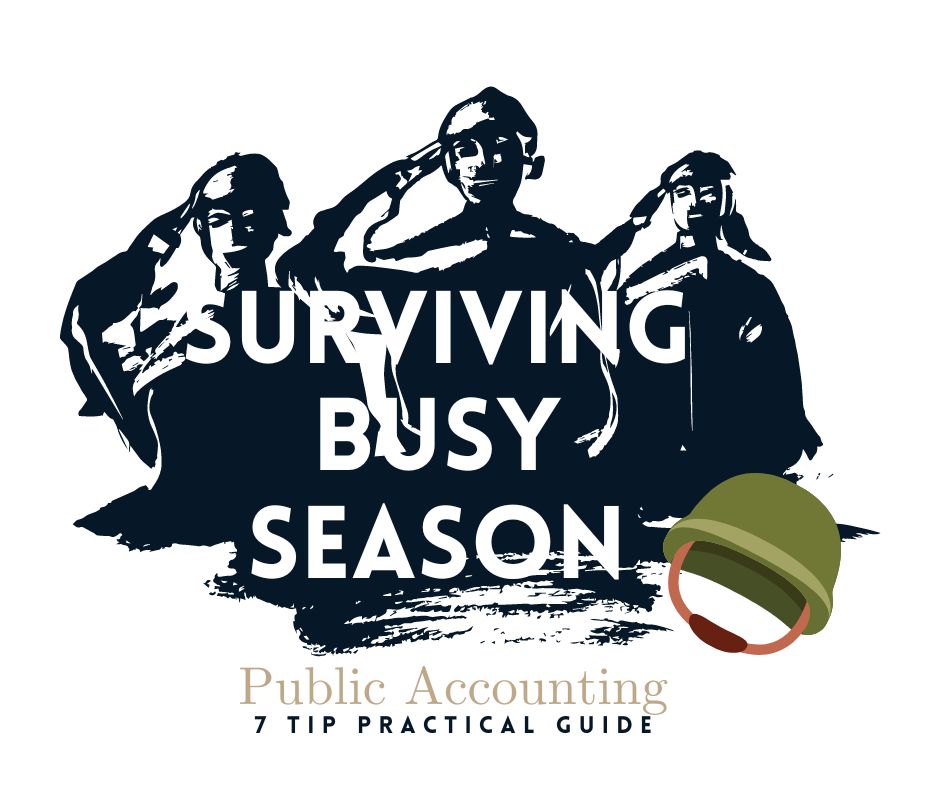What is considered “Busy Season” in Public Accounting?
If you are familiar with public accounting in any way, then you have probably heard the term “Busy Season”. Typically, busy season in public accounting is referred to the period between January and April each year.
This time of year is generally the busiest time in public accounting due to various tax and audit deadlines. Most individual tax returns, and many business tax returns generally need to be filed by April. Audits are also conducted on an annual basis for many companies, and these typically take place a few months after the end of a business’s fiscal year. For many which have a calendar year end, this means audits will need to be performed during the first few months of the following year.
Of course, depending on the type of clients being served, there are many different deadlines that may require other “Busy Seasons” throughout the year. Busy season is typically characterized by longer then normal work hours over the course of several weeks and months. Depending on the size of firm and types of clients served, this may require anywhere from 45-hour work weeks to 80-hour work weeks. Yikes!
Before Busy Season Starts
Tip #1: Prepare Mentally
Just knowing and having the expectation that you will need to put in longer hours, but that it is only temporary is a good first step in preparing for busy season. Especially if you are fairly new in your career and this is your first one. Don’t allow yourself to stress too much about the upcoming work load, however, prepare your mind for the challenging task and be ready – whatever “Ready” might look like for you!
Tip #2: Get Organized
Make sure that any client work for other clients prior to busy season has been wrapped up as much as possible before busy season starts. Busy season clients are already going to be stressful enough, having additional items lingering on your to-do list should be avoided at all cost.
Also, if possible, take a few hours before busy season, and organize all of your files. Organize and categorize your emails. Delete items in folders you no longer need, and take time to learn additional tips and tricks for whatever software you are using to make organizing your time, tasks, and files a simple process.
Getting organized may also include cleaning up your desk, briefcase, and other related workspace so that you have a good open environment to tackle whatever tasks come your way.
Tip #3: Set Expectations With Friends & Family
Working long hours in any job can not only weigh ones personally well-being, but it can also effect those closest to you. Make sure when going into busy season that you set correct expectation for friends and family, especially those in closest to you such as your significant other. Help them to understand that you wont be available for as many social events, or late-night chats. Let them know that you care about them and look forward to spending lots of time with them once you get through this crazy deadline work season. If you give those you love advanced warning, chances are that they will be more understanding, then if you don’t make them aware of the situation and just start ignoring their calls.
During Busy Season
Tip #4: Keep Up With Your Physical Health
It is very easy to ditch exercise, and get into the habit of ordering in most days when work, sleep, repeat become the new modo. Don’t give into the temptation to skip out on your personal healthy. Why? Well, first off, life is too short to run yourself into the ground. Secondly, although it might seem beneficial to skip the workout and get an extra hour of work done, keeping up healthy habits will allow you to have more energy throughout the day, and keep stress levels at bay which will ultimately make the hours that you are working, more productive, and better quality. Plus, you will decrease the risk of burnout. Choose exercise! And eat a salad!
Tip #5: Find a Schedule That Works For You
This next tip will largely depend on the firm you work for, your team needs, and other individual circumstances. Typically, you may not have complete control over when you will be required to work. Some firms may require you to be in the office at specific times of day and may even require weekend hours. From my personal experience however, while I have always been required to work during the typical office hours at the minimum, how late I work and how early I come into the office tend to have a bit more flexibility.
For example, I had a coworker who liked to come in at 6 or 7am before everyone else, when the office was quite to get work done, and get ahead for the day. He also tended to leave a little later. I also had coworkers strolling into the office at 9am or even 10am, but staying late until 8 or 9 at night. I know some people who may stop working at 6pm, leave to grab dinner and take a short break, then return to put in a few extra hours. This was the same for weekends. I typically liked to put in several hours of work in on a Saturday, and then take Sunday completely off of work to have a day to recharge. Others liked to work for a shorter amount of time on both days to not feel like they were working all day. The point is, find out where there is flexibility and find a schedule that works best for you and for your needs, when possible.
Tip #6: Develop Good Relationships With Coworkers
This particular tip is not just for busy season, but I figured it was an important point to make. At the end of the day, those you see at work will typically be those you spend most of your days and even life with. Especially during busy times, and if you work with a team, which is typical in public accounting, then you should expect to be around a few other individuals on a constant daily basis. Make friends! Having people around you that you generally like to be around can make work a lot more enjoyable and makes the biggest difference when working long hours.
After Busy Season
Tip #7: Take a vacation
After the work, comes the reward. Treat yourself after busy season. Whether that be a cruise, a beach day, or a weekend of Netflix and pajamas, take some time after busy season to refuel and refresh. Knowing I have something nice planned for after busy season, was always a good motivator for me to keep working hard. It’s also a way to not get permanently burned out throughout the year. Taking a break is a step I can’t recommend enough. Often it becomes too easy to go from one thing to the next, and never really appreciating what has been accomplished. Getting through busy season is a huge accomplishment. Don’t forget to celebrate!
Keep Calm and Take Charge of Busy Season! You Got This!

